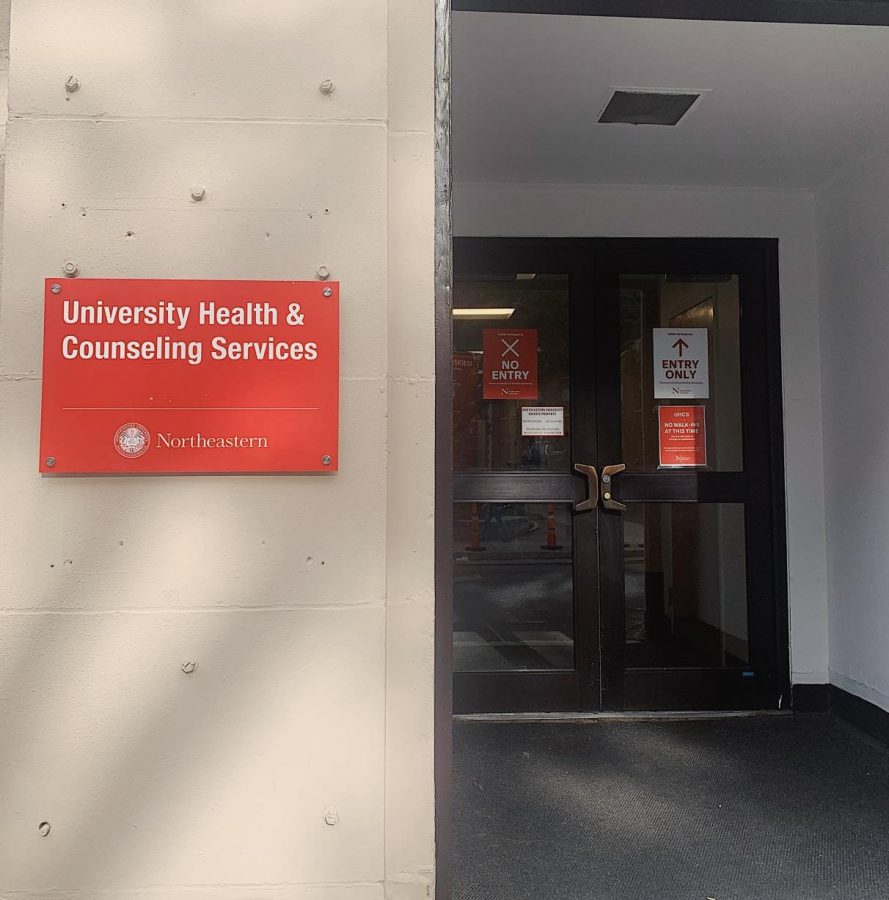Column: Northeastern isn’t “Protecting the Pack” when it ignores mental health
An entrance to the UHCS building on Forsyth Street.
March 3, 2021
Content warning: discussion of suicidal thoughts
Editor’s note: The Huntington News wants students to know Northeastern University and elsewhere provide mental health resources for students.
- WeCare: wecare@northeastern.edu, 617-373-7591, 226 Curry
- University Health and Counseling Services (UHCS): uhcs@northeastern.edu, 617-373-2772, Forsyth Building, 1st Floor
- 24/7 Mental Health Support: for students by phone (FIND@Northeastern) – 877-233-9477 (U.S.), 781-457-7777 (international)
- Suicide Prevention Hotline: 1-800-273-8255
- OptiMindHealth Back Bay: 617-507-1472, 800 Boylston St 16th Floor, Boston, MA 02199
- Network of Care Massachusetts: COVID-19 mental health support
Last September, before coming to campus, I wrote an op-ed about Northeastern’s hypocrisy in asking students to “protect the pack” while at the same time ignoring the demands and needs of the community, specifically demands for better mental health treatment. Now that a pandemic semester has passed, I would like to reinstate and update my position on the matter.
My initial view was that the entire system of mental health support was broken and poorly funded, with the blame falling squarely on University Health and Counseling Services, or UHCS. I now know that this isn’t exactly the case.
I first began to change my mind when I read statements from UHCS Executive Director Christine Civiletto from last December. What struck me was her empathy toward the students who had spoken out against the department and her willingness to adapt to student demands. Developing online tools to help students find therapists and partnering with student groups to provide support are small steps to better UHCS, but something significant is still missing. In my mind, that “something” is an expansion of health resources, which includes hiring more counselors and physicians to service the community. Civiletto suggests that this could be done, but it is seemingly impossible with the department’s limited budget and resources. At the moment, UHCS’ student to therapist ratio is around 1,300 to one. For comparison, MIT’s ratio is about 140 to 1.
I find this deeply troubling because I know that Northeastern is not short of money. In the past month, the Student Government Association passed a referendum requesting that the administration increase UCHS’ budget to hire more counselors. I’ll believe it when I see it.
Look at the giant hole in the ground filled with cranes, trucks, concrete and steel that will soon become a second science and engineering complex. Or what about the recently announced plans for a second LightView apartment complex, which has brought on a well-deserved lawsuit from Roxbury residents combating gentrification. You’re telling me that there’s always been enough money for these structural behemoths and never enough money to hire new therapists, who are likely paid a paltry fraction of the cost of a construction project in downtown Boston? These issues seem much larger than UHCS, with foundations in the pocketbooks of the university.
Which leads me to ask: What does our school prioritize?
It is no longer the health and education of its student body, for these are only the tools used to garner a higher national ranking. It is only now that I realize Northeastern only cares about its profits and donations; its national image and its board of directors.
There are those who will say this is to be expected from a private institution, since they are businesses that must make money to survive. I say that this is not a school being described, but a firm treating its students as materials and products who will go out into the world and hopefully donate later — one needs only to look at the annual “Giving Day” to understand the university’s desire for money from its students, many of whom are already struggling with debt.
If we are being treated as emotionless materials and products, then we aren’t being trained to be “robot-proof.” We’re just becoming robots. To understand Northeastern’s focus on ranking and profit, one can also look at the building projects I described above. The building and enhancement of dorms and engineering facilities are sexy, exterior additions that can easily be shown off in an advertisement or tour.
The problem is: Mental health isn’t sexy. In an era where mental health still remains a taboo topic, campus tours aren’t likely to talk about how many therapists are on campus, so the entire health department has its budgets cut and tucked into the corner of a building hardly anyone can find.
But, let me offer the benefit of the doubt. Perhaps the administrators deciding budgets and crafting slogans don’t truly understand the seriousness of mental health, and how deep the abyss really is for those who suffer from these illnesses. Maybe they haven’t sat on the floor of their kitchen in the middle of the night, trying to silence their crying to avoid waking up their roommates; maybe they haven’t felt the crushing weight of loneliness that forces the air out of their lungs; maybe they haven’t tested to see how “suicide-proof” the dorm windows really are.
But I have. And it feels like they haven’t.
To me, this isn’t about business, nor is it about budgets or donors. It’s my life. So, I’m begging you, Northeastern, to truly put in the effort to protect the pack, because it seems you care more about the guarantee of a donation than the guarantee of my safety.
George LaBour is a fourth-year combined economics and history major. He can be reached at labour.g@northeastern.edu.







